Cortex 7(2):127–142.
Lissauer, H. (1890). Ein fall von seelenblindheit nebst einem beitrage zur theorie derselben. Archiv für Psychiatrie und Nervenkrankheiten 21:222–270.
Logothetis, N. K., Pauls, J., & Poggio, T. (1995). Shape representation in the inferior temporal cortex of monkeys. Current Biology 5(5):552–563.
Longtin, C.-M., Segui, J., & Hallé, P. A. (2003). Morphological priming without morphological relationship. Language and Cognitive Processes 18:313–334.
Lukatela, G., Frost, S. J., & Turvey, M. T. (1998). Phonological priming by masked nonword primes in the lexical decision task. Journal of Memory and Language 39:666–683.
McCandliss, B. D., Cohen, L., & Dehaene, S. (2003). The visual word form area: Expertise for reading in the fusiform gyrus. Trends in Cognitive Sciences 7 293–299.
McCandliss, B. D., Curran, T., & Posner, M. I. (1993). Repetition effects in processing visual words: A high density ERP study of lateralized stimuli. Neuroscience Abstracts 19:1807.
McCarthy, R. A., & Warrington, E. K. (1990). Cognitive neuropsychology: A clinical introduction. San Diego: Academic Press.
McClelland, J. L., & Rumelhart, D. E. (1981). An interactive activation model of context effects in letter perception: I. An account of basic findings. Psychological Review 88:375–407.
McCloskey, M., & Rapp, B. (2000). A visually based developmental reading deficit. Journal of Memory and Language 43:157–181.
McCloskey, M., Rapp, B., Yantis, S., Rubin, G., Bacon, W., Dagnelie, G., Gordon, B., Aliminosa, D., Boatman, D. F., Badecker, W., Johnson, D. N., Tusa, R. J., & Palmer, E. (1995). A developmental deficit in localizing objects from vision. Psychological Science 6:112–117.
McConkie, G. W., & Rayner, K. (1975). The span of the effective stimulus during a fixation in reading. Perception and Psychophysics 17:578–586.
McConkie, G. W., & Zola, D. (1979). Is visual information integrated across successive fixations in reading? Perception and Psychophysics 25(3):221–224.
McCrory, E. J., Mechelli, A., Frith, U., & Price, C. J. (2005). More than words: A common neural basis for reading and naming deficits in developmental dyslexia? Brain 128(Pt 2):261–267.
McMonnies, C. W. (1992). Visuo-spatial discrimination and mirror image letter reversals in reading. Journal of the American Optometric Association 63(10):698–704.
Malach, R., Levy, I., & Hasson, U. (2002). The topography of high-order human object areas. Trends in Cognitive Sciences 6(4):176–184.
Mann, V. A. (1986). Phonological awareness: The role of reading experience. Cognition 24(1–2):65–92.
Marcus, G. F., & Berent, I. (2003). Are there limits to statistical learning? Science 300(5616):53–55.
Marcus, G. F., Vijayan, S., Bandi Rao, S., & Vishton, P. M. (1999). Rule learning by seven-month-old infants. Science 283(5398):77–80.
Marinkovic, K., Dhond, R. P., Dale, A. M., Glessner, M., Carr, V., & Halgren, E. (2003). Spatiotemporal dynamics of modality-specific and supramodal word processing. Neuron 38(3):487–497.
Marks, L. E. (1978). The unity of the senses. New York: Academic Press.
Marshall, J. C., & Newcombe, F. (1973). Patterns of paralexia: A psycholinguistic approach. Journal of Psycholinguistic Research 2:175–199.
Martin, A., Wiggs, C. L., Ungerleider, L. G., & Haxby, J. V. (1996). Neural correlates of category-specific knowledge. Nature 379:649–652.
Martinet, C., Valdois, S., & Fayol, M. (2004). Lexical orthographic knowledge develops from the beginning of literacy acquisition. Cognition 91(2):B11–22.
Matsuzawa, T. (1985). Use of numbers by a chimpanzee. Nature 315(6014):57–59.
Maurer, D., Pathman, T., & Mondloch, C. J. (2006). The shape of boubas: Sound-shape correspondences in toddlers and adults. Developmental Science 9(3):316–322.
Maurer, U., Brem, S., Bucher, K., & Brandeis, D. (2005). Emerging neurophysiological specialization for letter strings. Journal of Cognitive Neuroscience 17(10):1532–1552.
Maurer, U., Brem, S., Kranz, F., Bucher, K., Benz, R., Halder, P., Steinhausen H. C., & Brandeis, D. (2006). Coarse neural tuning for print peaks when children learn to read. Neuroimage 33(2):749–758.
Maurer, U., Bucher, K., Brem, S., & Brandeis, D. (2003). Altered responses to tone and phoneme mismatch in kindergartners at familial dyslexia risk. NeuroReport 14(17):2245–2250.
Mayall, K., Humphreys, G. W., Mechelli, A., Olson, A., & Price, C. J. (2001). The effects of case mixing on word recognition: evidence from a PET study. Journal of Cognitive Neuroscience 13(6):844–853.
Mayall, K., Humphreys, G. W., & Olson, A. (1997). Disruption to word or letter processing? The origins of case-mixing effects. Journal of Experimental Psychology: Learning, Memory, and Cognition 23(5):1275–1286.
Mazoyer, B. M., Dehaene, S., Tzourio N., Frak, V., Syrota, A., Murayama, N., Levrier, O., Salamon, G., Cohen, L., & Mehler, J. (1993). The cortical representation of speech. Journal of Cognitive Neuroscience 5:467–479.
Mechelli, A., Gorno-Tempini, M. L., & Price, C. J. (2003). Neuroimaging studies of word and pseudoword reading: consistencies, inconsistencies, and limitations. Journal of Cognitive Neuroscience 15(2):260–271.
Mehler, J., Jusczyk, P., Lambertz, G., Halsted, N., Bertoncini, J., & Amiel-Tison, C. (1988). A precusor of language acquisition in young infants. Cognition 29: 143–178.
Mello, N. K. (1965). Interhemispheric reversal of mirror-image oblique lines following monocular training in pigeons. Science 148:252–254.
Mello, N. K. (1966). Interocular generalization: A study of mirror-image reversal following monocular discrimination training in the pigeon. Journal of the Experimental Analysis of Behavior 9(1):11–16.
–—. (1967). Inter-hemispheric comparison of visual stimuli in the pigeon. Nature 214(84):144–145.
Meng, H., Smith, S. D., Hager, K., Held, M., Liu, J., Olson, R. K., Pennington, B. F., DeFries, J. C., Gelernter, J., O’Reilly-Pol, T., Somlo, S., Skudlarski, P., Shaywitz, S. E., Shaywitz, B. A., Marchione, K., Wang, Y., Paramasivam, M., LoTurco, J. J., Page, G. P., & Gruen, J. R. (2005). DCDC2 is associated with reading disability and modulates neuronal development in the brain. Proceedings of the National Academy of Sciences 102(47):17053–17058.
Merzenich, M. M., Jenkins, W. M., Johnston, P., Schreiner, C., Miller, S. L., & Tallal, P. (1996). Temporal processing deficits of language-learning impaired children ameliorated by training. Science 271(5245):77–81.
Miozzo, M., & Caramazza, A. (1998). Varieties of pure alexia: The case





